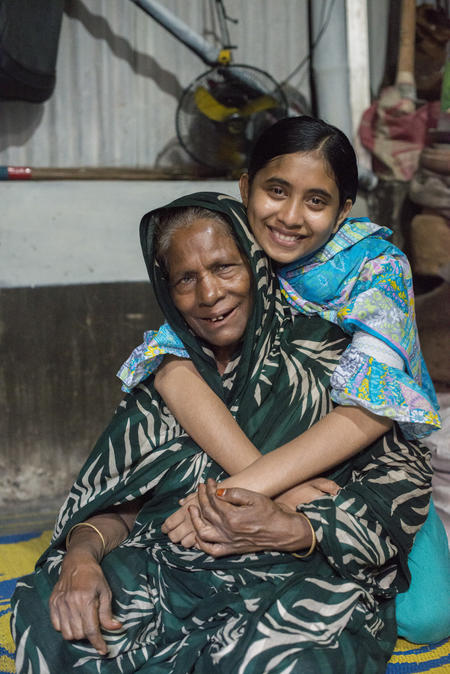Mitu Akhter | The Changemaker

Using soap to wash hands is more effective than using water alone, says the change agent Mitu Akhter.
She said in past, we washed our hands only with water. But the training we received taught us that handwashing is the best practice in fighting germs when done properly with soap and water. The training was provided and funded by WaterAid Bangladesh and Lindex in 2018.
Through the training, we started to learn to make soapy water and then we introduced it in our community. The low-cost solution for handwashing has benefitted to the people who cannot afford to buy soaps.
Since the coronavirus outbreak began, the community members started using the soapy water. We have been raising awareness on the safety measures with some simple rules like wearing masks, washing hands and keeping physical distance in public places. Through the project contactless handwashing devices are installed which operates by foot by reducing the human hand touch. The project provided us microphones to announce simple precautions to reduce the chances of being infected or spreading COVID-19. We were given protective gear, goggles, mask and hand gloves during the awareness campaign.
It came to notice that after the awareness campaign people were conscious of wearing protective gears and practice of washing hands. After the campaign, no confirmed cases were identified in my area, says Mitu Akhter who lives in a slum in Kallyanpur, Dhaka, Bangladesh.
Raised by her mother Lajju Begum, a ready-made garment worker, Mitu always strives to make a change in her community. As a change agent, Mitu is voicing to make a significant social impact in her community and improving their wellbeing.
The 15-year-old girl received training on the Water Safety Plan (WSP), Sanitary Safety Plans, Menstrual Hygiene Management (MHM) and proper way of handwashing. Mitu involves her community people to actively participate in for ensuring safe and sustainable water supply, decent toilets and handwashing facilities. She promotes female-friendly toilets, safe drinking water points, and access to menstrual hygiene facilities.
With the help of volunteers, Mitu keeps checking on the availability of soapy water in toilets in her area. She makes soapy water by diluting powdered laundry soap or liquid soap in a bottle. She refills the bottles whenever it is required. To change people’s hygiene behaviours, she has been sharing her knowledge among peers and family members.
“In the beginning, it was difficult to make people understand about the health risks of an unhealthy environment and unhygienic wash practices.
Earlier, there was neither a safe drinking water facility nor a decent toilet in our community. People would openly defecate and hardly realised the connection between open defecation and disease transmission via the ‘faecal-oral’ route by flies over food and water.
Once the facilities were installed under the project, we approached and encouraged people to use and practice the WASH habits for their safety. With support from the project, separate toilets and shower places were built especially for women and girls. The toilets have access to safe and convenient facilities to dispose of used menstrual and handwashing facilities inside the toiletwhich
Women and girls have lessened their practice of using dirty rags when menstruation. They now use sanitary products that can be cleaned or disposed of easily. The practice has also reduced the risk of exposed to urinary tract infections. People are now aware of their health and living conditions.”
As Mitu concludes, “Access to improve water and sanitation, we have managed to change hygiene behaviours in the community. The challenges and responsibilities have increased towards our community, especially in the time of Covid-19. So, we are accelerating our efforts in making the WASH practices sustain during COVID-19 and beyond.”














